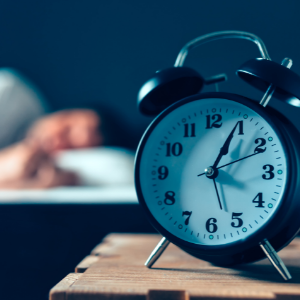
Staff at Cumbria, Northumberland, Tyne and Wear NHS Foundation Trust (CNTW) have published a paper showing how their ‘Smarter Sleep’ resources have been effective in helping inpatients to get a better night’s sleep in hospital.
It can be difficult to get to sleep on a ward. But sleep is important for our mental and physical health. It’s also important to be well-rested to get the most out of the treatment you are being given in hospital. Because of this, staff at CNTW have been working on projects to help inpatients get a better night’s rest. They have now published a peer-reviewed paper in the British Journal of Psychiatry Bulletin which shows that the resources they developed were effective in a controlled study.
The Pharmacy team at CNTW worked with the North East England Regional Sleep Disorders Service and several Consultant Psychiatrists to create the Smarter Sleep resources. These resources aim to help people get better sleep without needing to use sleeping tablets.
People who are struggling to sleep are often prescribed sleeping tablets, also known as hypnotics. These medicines are safe when used for a few weeks. But using them for longer can make someone dependent on them and have some side-effects.
The resources the team created include a short film, posters, and a sleep diary. There is also a reference book for patients and healthcare professionals.
These aim to help people to change their understanding and behaviour around sleep. They contain information about strategies for sleeping better, such as ‘sleep hygiene’ (good habits that help us get to sleep). There are also exercises based on Cognitive Behavioural Therapy. They also include advice about identifying and managing common sleep disorders.
For their study, the team introduced these resources on seven wards. This resulted in the number of sleeping tablets being prescribed on these wards dropping by almost a quarter (24%). Staff said that they felt more confident about helping people sleep better without needing to use medications.
Our study has shown that these educational resources have been really well-received by staff and patients on the wards. They have helped inpatients to get a better night’s sleep, which is vital for their treatment and recovery.
Alastair Paterson, specialist clinical pharmacist at CNTW and the lead author of the paper, said: “Good sleep is often so hard to get while in hospital. With these Smarter Sleep resources we are working to improve things.
“Our study has shown that these educational resources have been really well-received by staff and patients on the wards. They have helped inpatients to get a better night’s sleep, which is vital for their treatment and recovery.
“We are continuing to develop the resources and roll them out to other wards across the Trust, to help everyone get good sleep while they are under our care.”
The Smarter Sleep resources are linked to the Positive and Safe Care team’s SleepWell project. This project works to improve people’s sleep while staying on CNTW’s inpatient wards. The project has also explored ways to safely reduce night-time checks and disturbances on the wards. Simple but effective changes to surroundings, like adding soft-close bins and doors, have also been effective. The project has received excellent feedback from patients and staff, and was highly commended at the 2020 Health Service Journal Patient Safety Awards.
Top tips for improving your sleep include:
- Record your sleep using a sleep diary
- Simple lifestyle changes can help, for example exercising during the day and a screen-free wind-down period before bed
- Create the right environment for sleep – a calm, cool room with minimal disruptions
- Reduce how much caffeine, alcohol and nicotine you have
- Ask your pharmacist to review your medication – some medicines can make you sleepy during the day, or make it harder to sleep at night
- Try to spend time outside in natural light every day
- Set a regular wake up time, and go to bed when you feel sleepy
